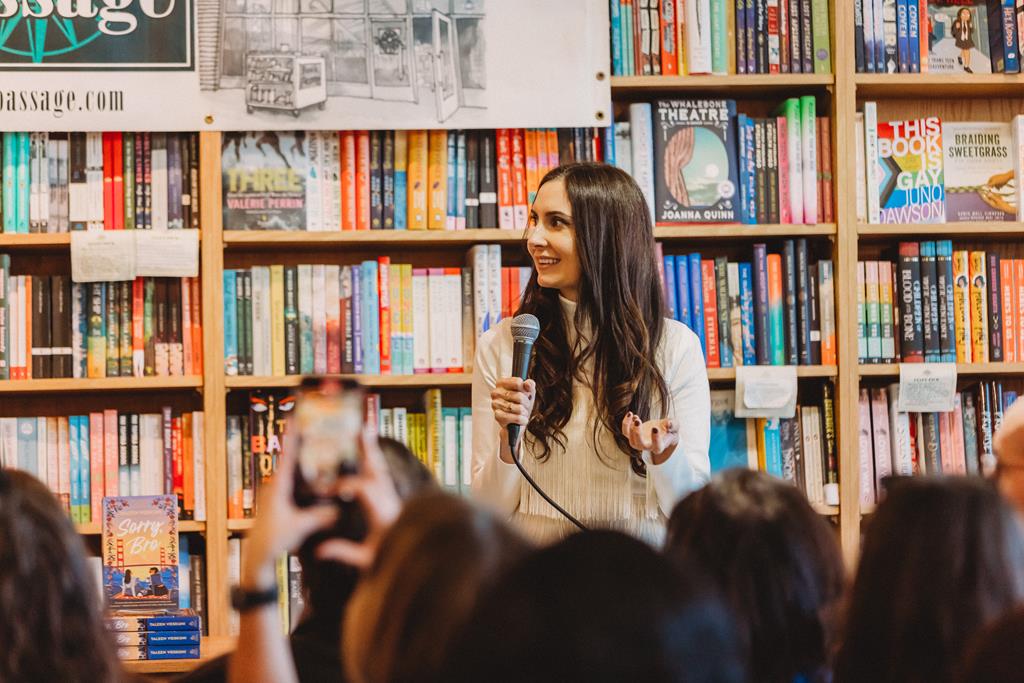This interview has been edited for clarity and flow.
Hi, Taleen. Could you start by telling me about the beginning of your writing journey?
My mom just reminded me the other day that when I was about five years old I would draw pictures because I couldn’t write and I couldn’t spell, but I was telling stories. I always loved to do it. It was in 2016 that I decided I was going to get serious about trying to write a novel and unlearning everything I thought I knew. I embarked on this great writing journey where I took a lot of classes, outlined, and wrote a novel that was not, Sorry, Bro, but another romance that will never see the light of day. Then, in 2020, I started Sorry, Bro. The words and the voice flowed in a way that had never done before. I never wrote with voice until, Sorry, Bro, but now, I have a pretty clear authorial voice.
What was your inspiration for Sorry, Bro? Was there a reason that you decided to write from Nar’s point of view?
It’s Nar’s journey. Nar has the most to learn in this book, and that’s usually a good person to pick as your protagonist. Even if you have multiple points of view and you’re not sure who’s the main character, it’s usually the person that needs to grow the most.
Nar had a lot of misconceptions; beliefs she held as true, but that weren’t true. I wanted to really get in her shoes and show the way she changes her mind about her identity. We were in her head for the whole thing, so we really got to know her.
Was there inspiration for characters like Nar, her Grandma or her Mother?
Yes and no. The characters were all inspired by bits of real life people. The mom isn’t one-to-one with my mom. I actually never knew my grandmother, my Armenian grandmother, which is so sad and such a loss for me. Apparently she was just the kindest woman in the world. I did know my Armenian grandfather, so Nene [Nar’s grandma] was a really fun character to write. I infused bits of my grandfather into her and into who I imagine.
In Sorry, Bro, you begin your chapters with selected Proverbs. Was there a reason you decided to do this?
Yeah, I saw Nancy Kricorian, who’s the author of Zabelle, among other books, posting those proverbs on Twitter and they captured my imagination. I bought a book of Proverbs, and then I reached out to Nancy and she suggested a second book that I should look at. I read those books and highlighted specific proverbs and then decided I’m going to make them the epigraphs of my book. They just infused a little bit of extra Armenian culture.
Is there a reason you called it Sorry, Bro?
Yeah, it was a joke. Originally, my husband and I were out to dinner and he knows that “bro” is very Armenian, so he said you should call it, Sorry, Bro: a Tale of Bi Awakening or Lesbian Awakening. I decided I was going to cut that subtitle, but Sorry, Bro, is actually a really great title! I wanted it to have a slightly Armenian element but of course no one but Armenians see it that way. You either love the title or you hate it, but it’s memorable and people won’t easily forget what it’s called.

What has the response from the Armenian community been like after writing a queer focused book?
It’s been better than I thought. I’ve still braced myself for negative comments, but none have come. I had a surprising amount of people from the Armenian community come to my launch event. People I would’ve never thought would come, came. They showed up and they supported me.
I’ve had a lot of “oh my gosh, this reminds me of my, my mom, my aunt, my teacher.” That’s such a great feeling for me to know that I’ve been able to portray characters from our lives on the page in a way that they haven’t appeared before. There have been lots of Armenian books, but not modern, lighthearted diaspora ones.
Have we seen the last of Nar’s story? Would you ever consider writing a sequel?
It might be the end of their story, but they’re also good now. Sometimes it’s hard when characters get the happy ending to then write a new book that has conflict because I don’t want that.
Would you ever consider writing another book focused on Armenian identity, but in a different way?
I did a little bit with my second book Lavash at First Sight, where there’s a lot of almost implied Armenian culture. I love it. It’s what I wanna keep writing about. There’s still unexplored territory there and more that needs to come out.
What’s next for you, would it just be Armenian-focused novels or do you think you would ever decide to branch out into something different?
We’ll see, never say never. There may always be Armenian characters in my books, but the deep focus wouldn’t be Armenian. Through writing Sorry, Bro, I realized I want to write from my experience. Maybe if I run out of things I want to say about being Armenian I will shift my focus. But for now there’s still a lot I want to say.
Gianna Dinwoodie is currently working towards her BA in Political Science and hopes to pursue a minor in Journalism. When she is not seen writing mountains of essays for her classes, she enjoys poetry and literature of any sort. Especially of the horror or psychological thriller genre! Don't ask her to watch a horror movie though, she'll probably cry...


